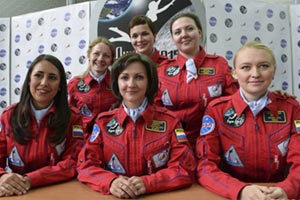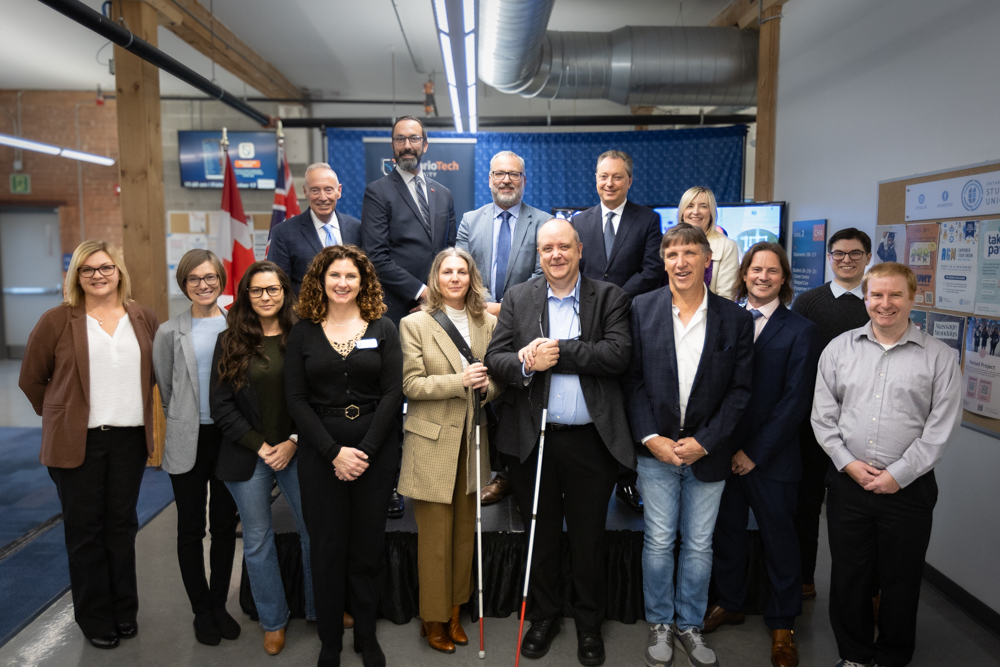Ontario Tech University-based health informatics research goes out of this world
Dr. Carolyn McGregor collaborates with Russian simulated moon mission
November 6, 2015

OSHAWA, ONTARIO – Health analytics research pioneered at the Ontario Tech University (UOIT) now has a key connection to the Russian space program.
Dr. Carolyn McGregor AM*, Canada Research Chair in Health Informatics is collaborating with Russia’s Institute of Biomedical Problems (IBMP) of the Russian Academy of Sciences and the Russian Federal Space Agency (Roscosmos) on Luna-2015 – an eight-day simulated lunar mission involving a female-only crew.
The October 28 to November 6 ‘mission’ examined how women respond physically and mentally to conducting scientific experiments in the confined space of a sealed room in an IBMP lab near Moscow. The experiment allowed researchers to study the physiology and psychology of female bodies during distant space missions.
The connection to Dr. McGregor’s research is Artemis, her Big Data analytics platform capable of real-time monitoring of multiple streams of physiological data simultaneously from multiple patients.
“After all of the success we’ve had to date applying Artemis to monitor the health data of premature infants and other critical-care environments, I am very excited we are advancing Artemis toward applications for use in space,” said Dr. McGregor. “Just as with neonates, our cloud computing platform allows doctors to monitor patients’ physiological data from a remote location. Artemis could ultimately be applied for use on the International Space Station and NASA’s proposed 2030 Mission to Mars.”
The six women – volunteers from the Russian Academy of Sciences had to pass the rigorous criteria of any similar prolonged isolation experiment. Until recently, the effects of the short-radius centrifuge (simulated gravity) were performed exclusively on male populations. The centrifuge spin creates an artificial force of gravity on the body, preventing bones and muscles from atrophying during the sensation of weightlessness.
Key health analytics goals related to Luna-2015:
- How to prevent or minimize the negative effects of microgravity on the body.
- Physiological observation of the cardiovascular system under conditions of space flight (smartphone application and pulse wave monitor via earlobe clip).
- Application of ergospirometry sensors on different body parts to record data about the relationship of the right and left compartments of the heart, energy of the heart, as well as strength of muscle contractions.
- Immunity, metabolism, hygiene and microbiological tests.
This research is part of a longer-term strategic research program Professor McGregor has established with IBMP for new approaches to health assessment of cosmonauts. In co-operation with Russian scientists, plans in the near future call for Artemis to be sent into space.
“I can’t tell you how excited I am that I will be working with the data collected from this experiment as a researcher, a computer scientist, a biomedical engineer and especially as a woman,” said Dr. McGregor. “I am deeply honoured to be working with researchers such as Russia’s Dr. Roman Baevsky who has been involved in research relating to cosmonaut health since Russia first sent cosmonauts into space.”
*AM – denotes of Order of Australia recipient (2014)
Related links
- Dr. Carolyn McGregor’s Ontario Tech University Expert Centre profile
- Follow Dr. Carolyn McGregor on Twitter
- Canada Research Chair in Health Informatics home page (background information on Artemis and data mining)
- Russia Institute of Biomedical Problems
- Russian Federal Space Agency
- RT International online news story (shows Luna-2015 lab)
Selected recent UOIT news stories
- Ontario Tech University-based health informatics research pushing new frontiers in critical care
- Ontario Tech University professor named 2015 Advance Global Australian Award winner
- Dr. Carolyn McGregor participates in U.S. podcast on Big Data
- Big Data: Inside the Algorithm
- Ontario Tech University Dr. Carolyn McGregor profiled in new Science Museum exhibit in Britain
- Ontario Tech University researchers help support the transition to paperless health information system at Ontario Shores
- Ontario Tech University professor receives Australia’s highest honour
- Ontario Tech University-led Artemis Project captures national Ingenious Award
Media contact
Bryan Oliver
Communications and Marketing
Ontario Tech University
905.721.8668 ext. 6709
289.928.3653
bryan.oliver@ontariotechu.ca



